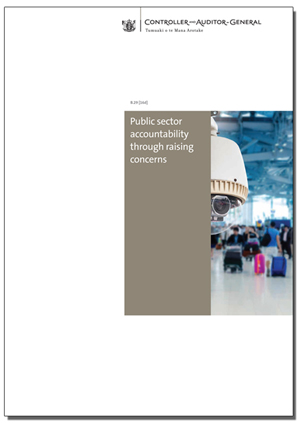I’ll settle for second best. Yeah right.
 Don’t get me wrong – we are so incredibly lucky to live in a country where we are actively encouraged to speak up and have our voices heard. But is speaking up and being heard by the right people as easy as it sounds? And does it make a difference?
Don’t get me wrong – we are so incredibly lucky to live in a country where we are actively encouraged to speak up and have our voices heard. But is speaking up and being heard by the right people as easy as it sounds? And does it make a difference?
Our Office recently did some work to find out what people can do when they’re unhappy with a decision made by a government department, local council, or some other government agency. We call this public accountability, and recently published our findings in our report Public sector accountability through raising concerns.
When I began researching the ways people can raise their concerns or make complaints about public sector entities, my first thought was, “How hard can it be?” It can sometimes be very hard, as it turned out. There was no “public accountability for dummies” handbook I could turn to for information, or a single list of organisations that people could go to.
In the end, we identified about 400 different ways people can raise a concern or make a complaint. People should first make their complaint or raise their concern directly with the relevant public entity. They should be able to do this easily and be heard by the public entity. If people remain dissatisfied, it can be difficult to work out where to go next. They can become lost in a "black hole of bureaucracy". One reason for this is that little or no easily accessible information explains the subsequent options. When information is available, it can sometimes be difficult to understand.
It isn’t surprising that people might get frustrated if they don’t know where to go or who to talk to. Our Office has noticed that is becoming more common for people to be passionate and sometimes forceful when presenting their complaint or concern. Irritation is understandable when it is difficult and frustrating to get help. It can also take a toll on the staff who are dealing with frustrated members of the public.
If it is this complex and confusing for people wanting to raise a concern or complaint, what about the organisations that deal with these concerns or complaints? Is their part of the public accountability puzzle as difficult as the public’s?
We spoke with six key inquiry agencies that people can go to if they remain dissatisfied after exhausting all of a public entity's own complaint and review processes. These inquiry agencies face some different, but equally as difficult, challenges. Increasing numbers of complaints, complaints involving multiple public entities, and more material to review for individual complaints are just some of the challenges they told us they are having to deal with.
In true Kiwi fashion, the inquiry agencies are finding smarter and more efficient ways to carry out their public accountability roles while maintaining high levels of customer satisfaction. For example, the Human Rights Commission has a focus on using alternative dispute resolution and mediation processes to resolve people’s concerns early on. These can be less expensive and better for the parties’ relationships than formal methods such as going to the Human Rights Review Tribunal or the courts.
It was great to see that these inquiry agencies are rising to the challenge individually. Some of the agencies, including our Office, also support the idea of collaborating with each other when this is lawful and appropriate. Improving connections between each other will make it less complex and confusing for people wanting to raise a concern or complaint. As the saying goes, two heads are better than one, and we think that inquiry agencies working together when they can is likely to make it easier for people to get the right help sooner.
Sharing is caring
After all that you might be thinking, “what’s the point in telling me that it can be difficult to raise a concern or make a complaint about the public sector?” Well, we are hoping that some friends of ours might be able to make it a bit easier.
My colleague Charlotte has blogged about how we created a list of all the organisations we could find that people can go to when they need to raise their concerns or make a complaint. We shared this list with a number of community organisations and government agencies that play a role in helping people to get the help they need. As a result, the Govt.nz team at the Department of Internal Affairs took on the list to help it to improve its government information site. We hope that the information we have gathered can help in connecting people to where they can raise their concern or complaint so that they can do this more easily and quickly.
Our Office has also produced a series of reports on how some public sector entities handle complaints, to promote good complaint handling, and learning and improvement:
- Accident Compensation Corporation: How it deals with complaints
- Ministry of Social Development: How it deals with complaints
- Earthquake Commission: Managing the Canterbury Home Repair Programme - follow-up audit
- Reflections from our audits: Governance and accountability
I also sat down with Mike Scott (Assistant Auditor-General, Performance Audit Group) and Gary Emery (Manager, Performance Audit) to talk about our public sector accountability work:
